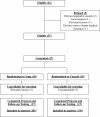Effect of an office worksite-based yoga program on heart rate variability: outcomes of a randomized controlled trial
- PMID: 23574691
- PMCID: PMC3648394
- DOI: 10.1186/1472-6882-13-82
Effect of an office worksite-based yoga program on heart rate variability: outcomes of a randomized controlled trial
Abstract
Background: Chronic work-related stress is an independent risk factor for cardiometabolic diseases and associated mortality, particularly when compounded by a sedentary work environment. The purpose of this study was to determine if an office worksite-based hatha yoga program could improve physiological stress, evaluated via heart rate variability (HRV), and associated health-related outcomes in a cohort of office workers.
Methods: Thirty-seven adults employed in university-based office positions were randomized upon the completion of baseline testing to an experimental or control group. The experimental group completed a 10-week yoga program prescribed three sessions per week during lunch hour (50 min per session). An experienced instructor led the sessions, which emphasized asanas (postures) and vinyasa (exercises). The primary outcome was the high frequency (HF) power component of HRV. Secondary outcomes included additional HRV parameters, musculoskeletal fitness (i.e. push-up, side-bridge, and sit & reach tests) and psychological indices (i.e. state and trait anxiety, quality of life and job satisfaction).
Results: All measures of HRV failed to change in the experimental group versus the control group, except that the experimental group significantly increased LF:HF (p = 0.04) and reduced pNN50 (p = 0.04) versus control, contrary to our hypotheses. Flexibility, evaluated via sit & reach test increased in the experimental group versus the control group (p < 0.001). No other adaptations were noted. Post hoc analysis comparing participants who completed ≥70% of yoga sessions (n = 11) to control (n = 19) yielded the same findings, except that the high adherers also reduced state anxiety (p = 0.02) and RMSSD (p = 0.05), and tended to improve the push-up test (p = 0.07) versus control.
Conclusions: A 10-week hatha yoga intervention delivered at the office worksite during lunch hour did not improve HF power or other HRV parameters. However, improvements in flexibility, state anxiety and musculoskeletal fitness were noted with high adherence. Future investigations should incorporate strategies to promote adherence, involve more frequent and longer durations of yoga training, and enrol cohorts who suffer from higher levels of work-related stress.
Trial registration: ACTRN12611000536965.
Figures
References
Publication types
MeSH terms
LinkOut - more resources
Full Text Sources
Other Literature Sources
Medical
Research Materials
Miscellaneous


